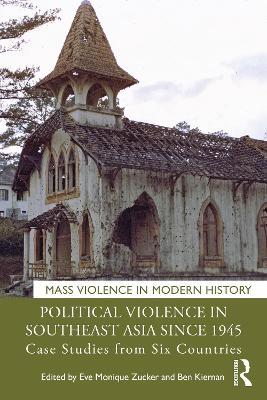
Political Violence in Southeast Asia since 1945
Routledge (Verlag)
978-0-367-67559-2 (ISBN)
This book examines postwar waves of political violence that affected six Southeast Asian countries – Indonesia, Burma/Myanmar, Cambodia, Thailand, the Philippines, and Vietnam – from the wars of independence in the mid-twentieth century to the recent Rohingya genocide.
Featuring cases not previously explored, and offering fresh insights into more familiar cases, the chapters cover a range of topics including the technologies of violence, the politics of fear, inclusion and exclusion, justice and ethics, repetitions of mass violence events, impunity, law, ethnic and racial killings, crimes against humanity, and genocide. The book delves into the violence that has reverberated across the region spurred by local and global politics and ideologies, through the examination of such themes as identity ascription and formation, existential and ontological questions, collective memories of violence, and social and political transformation. In our current era of global social and political transition, the volume’s case studies provide an opportunity to consider potential repercussions and outcomes of various political and ideological positionings and policies.
Enhancing our understanding of the technologies, techniques, motives, causes, consequences, and connections between violent episodes in the Southeast Asian cases, the book raises key questions for the study of mass violence worldwide.
Eve Monique Zucker is a lecturer in anthropology at Yale University, US. Her research focuses on the social, moral, and digital dimensions of remembrance and recovery after mass atrocities in Southeast Asia and beyond. Her books include Forest of Struggle: Moralities of Remembrance in Upland Cambodia; Mass Violence and Memory in the Digital Age; and Coexistence in the Aftermath of Mass Violence. Ben Kiernan is the A. Whitney Griswold Professor of History and founding Director (1994–2015) of the Genocide Studies Program at Yale University, US. His books include How Pol Pot Came to Power; The Pol Pot Regime; Blood and Soil; Genocide and Resistance in Southeast Asia; and Việt Nam.
Introduction Part 1: Dimensions of Mass Violence 1. A Time to Kill: The Anti-Communist Violence in Indonesia, 1965-66 2. Expulsion or Incorporation: Valences of Mass Violence in Myanmar Part 2: The Politics of Fear 3. Performative Violence and Philippine Populism 4. The Political Organization of Genocide: Central Orders and Regional Implementation under the Khmer Rouge 5. Violence against the Rohingya: Strategic and Ideological Drivers of Ethnic Cleansing Part 3: Minorities and the State 6. The Crucible of Điện Biên Phủ: Making Vietnam in the First Indochina War 7. The Khmer Republic’s Mass Persecution of the Vietnamese Minority in Cambodia, 1970-75 8. The Genocide of Rohingyas in Burma Part 4: Technologies, Techniques, and Ideologies 9. The Air War in Vietnam: Responses to the Machinery of Mass Violence 10. Medical Experiments, Blood and Gall: Revolutionary Utilization of the Body in Khmer Rouge Prisons Part 5: Justice, Ethics, and History 11. Assessing Genocidal Intent in the Context of Myanmar’s Rohingya 12. Justice after Dictatorship in Thailand 13. Investigating Genocide: Rithy Panh’s “S-21” (2004) 14. Vietnam, ASEAN, the Great Powers, and the Challenges of Learning from the Cambodian Genocide Part 6: The Shadow of the Past on the Present 15. The Mobilization of State-Sponsored Mass Organizations Since the 2006 Coup in Thailand 16. Something in the Water: Towards a Symbolic History of Otherness in Chrouy Changvar, Cambodia 17. Mass Violence and Mob Violence in Cambodia: Responses and Social Repair – Hope for the Future?
| Erscheinungsdatum | 20.04.2021 |
|---|---|
| Reihe/Serie | Mass Violence in Modern History |
| Zusatzinfo | 7 Tables, black and white; 15 Halftones, black and white; 15 Illustrations, black and white |
| Verlagsort | London |
| Sprache | englisch |
| Maße | 156 x 234 mm |
| Gewicht | 700 g |
| Themenwelt | Geisteswissenschaften ► Geschichte ► Regional- / Ländergeschichte |
| Naturwissenschaften ► Geowissenschaften ► Geografie / Kartografie | |
| Sozialwissenschaften ► Politik / Verwaltung ► Politische Systeme | |
| Sozialwissenschaften ► Politik / Verwaltung ► Politische Theorie | |
| ISBN-10 | 0-367-67559-5 / 0367675595 |
| ISBN-13 | 978-0-367-67559-2 / 9780367675592 |
| Zustand | Neuware |
| Haben Sie eine Frage zum Produkt? |
aus dem Bereich


